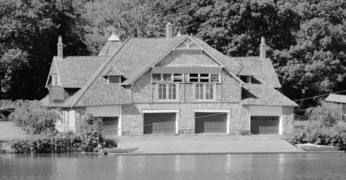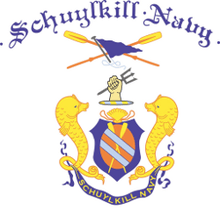University Barge Club
University Barge Club of Philadelphia (also known as UBC)[2] is an amateur rowing club located at #7 in the historic Boathouse Row of Philadelphia, Pennsylvania. It is listed on the National Register of Historic Places and designated a National Historic Landmark.[3] The Club's founding, in 1854, is considered the "dawn of organized athletics in the University of Pennsylvania."[4] Known as "the upper-class rowing club," UBC is a founder, and the most senior member, of the oldest amateur athletic governing body in the United States, the Schuylkill Navy.[5]
 | |
 | |
| Location | #7 Boathouse Row, Philadelphia, Pennsylvania, U.S.A. |
|---|---|
| Home water | Schuylkill River |
| Established | 1851 |
| Navy admission | 1854 (founding member) |
Key people |
|
| Membership | 250 active members[1] |
| Colors | Royal Blue and White |
| Affiliations | Chestnut Hill Academy, Springside School, University of Pennsylvania Alumni Rowing, and Head of the Schuylkill |
| Website | universitybarge.org |
Founding
University Barge Club was founded in 1854 by ten members of the University of Pennsylvania's freshman class:[6] They first rowed out of a Schuylkill boathouse near the Fairmount Waterworks known simply as "Charlie's boathouse".[7] The Club was officially formed when the founders purchased its first boat, the Hesperus, from Bachelors Barge Club.[8] Club members wore sailor uniforms from clothier Jacob Reed that were monogrammed with "U.B.C." on their hats and belts.[2] In 1855, members of the Club, in conjunction with the Philadelphia Barge Club, built a one-story brick boathouse on rented land.[8] The Club purchased a second boat, named Lucifer.[7] After 1860, both boats were moved to a space rented from the Philadelphia Skating Club, which is now the Philadelphia Girls' Rowing Club.[9]
At first, membership was limited to students enrolled at Penn, but the Club was not listed as a student organization of the University until 1867, when the University Barge Club won the Schuylkill Navy championship flag.[7] Membership was later opened to Penn alumni and certain non-alumni.[7]
Although the Club was still affiliated with the University, it gradually began to cater more to non-students.[8] As the Club's membership became dominated by Old Philadelphians[10] from the upper-class[5] aristocracy, student enthusiasm waned.[7]
In 1871, the Fairmount Park commission allowed the Club to build its own boathouse on Boathouse Row.[11] In 1872, Penn students formed an alternative club, the College Boat Club, to cater to students and focus on preparing for intercollegiate competitions.[7]
In 1887, University Barge Club leased an additional upriver clubhouse for social functions called The Lilacs on the west bank of the Schuylkill.[5][10] Today, while many of the University Barge Club's members are University of Pennsylvania graduates, the Club has no official affiliation with the University.[7]
University Barge Club is the sister club of Union Boat Club of Boston.[12] For more than 60 years, the two sister clubs have held an annual interclub "UBC" regatta.[12]
History of the boathouse
The boathouse, at #7-8 Boathouse Row, dates from 1871, and was greatly expanded in 1891.[13] Originally, University Barge Club only occupied #7, while Philadelphia Barge Club occupied #8. In 1932, University Barge Club acquired #8 when Philadelphia Barge Club ceased operations.[13]
 University Barge Club,
University Barge Club,
#7-8 Boathouse Row. Boathouse before 1891 expansion.
Boathouse before 1891 expansion.
References
- "University Barge Club". University Barge Club. Retrieved 5 May 2010.
- Thayer, John B. (June 1904). "The Early Years of the University Barge Club of Philadelphia". The Pennsylvania Magazine of History and Biography. 29. Philadelphia: Historical Society of Pennsylvania. pp. 287–88.
- "Listing of National Historic Landmarks by State" (PDF). National Historic Landmarks Survey, National Park Service. p. 81. Archived from the original (PDF) on August 24, 2009. Retrieved 6 May 2010.
- Thayer, John B. (June 1904). "The Early Years of the University Barge Club of Philadelphia". The Pennsylvania Magazine of History and Biography. 29. Philadelphia: Historical Society of Pennsylvania. p. 284.
- Baltzell, E. Digby (2001). "Upper-Class Clubs and Associations in Philadelphia". The Protestant Establishment Revisited. Transaction Publishers. p. 102. ISBN 978-0-7658-0664-2.
- Crowther, Samuel; Arthur Brown Ruhl (1905). "The Beginning of Rowing". Rowing and Track Athletics. New York: MacMillan. p. 24. J. Ashurst Bowie, Horace G. Browne, Alexander B. Coxe, Pemberton S. Hutchinson, Chas. I. Macouen, J. Beauclerc Newman, James H. Peabody, Edmund A. Robinson, George H. Waring, and John W. Williams.
- Tannenbaum, Seth S.; Hood, Clifton R.; McConaghy, Mary D. (April 2006). "University Barge Club founded 1854, Penn Crew in the 1800s". University Archives, University of Pennsylvania. Retrieved 6 May 2010.
- Thayer, John B. (June 1904). "The Early Years of the University Barge Club of Philadelphia". The Pennsylvania Magazine of History and Biography. 29. Philadelphia: Historical Society of Pennsylvania. pp. 285–86.
- Peverelly, Charles A. (1866). "University Barge Club". The Book of American Pastimes. New York: Author. pp. 204–05.
- Burt, Nathaniel (1999). "The Schuylkill Navy". The Perennial Philadelphians: the anatomy of an American aristocracy. University of Pennsylvania Press. pp. 297–98. ISBN 978-0-8122-1693-6.
- Stillner, Anna (2005). The Philadelphia Girls' Rowing Club: An Incremental Historic Structure Report (Thesis). p. 28. Retrieved 30 April 2010.
- "Thomas Eakins Head of the Schuylkill Regatta 2009 Program" (PDF). Thomas Eakins Head of the Schuylkill Regatta. 2009. p. 22. Retrieved 10 June 2010.
- "University Barge Club History". University Barge Club. Retrieved 6 May 2010.
Further reading
- "Boathouse Row". Living Places. Retrieved 30 April 2010.
- "National Register of Historic Places Inventory--Nomination Form". NPS Focus, National Register of Historic Places, National Park Service, US Department of the Interior. 27 November 1983. pp. 662–63. Retrieved 7 May 2010.
- Heiland, Louis (1938). The Schuylkill Navy of Philadelphia, 1858 - 1937. Philadelphia: The Drake Press, Inc. p. 81.
- Janssen, Frederick W. (15 August 1888). "University Barge Club". Outing Library of Sports: American Amateur Athletic and Aquatic History 1829-1888. New York. p. 213.
- Keyser, K. C. (1872). "University Barge Club". Fairmount Park: Sketches of its Scenery, Waters, and History (5th ed.). Philadelphia: Claxton, Remsen, and Haffelfinger. p. 135.
- Scharf, John Thomas; Westcott, Thompson (1884). "Public Squares, Parks, and Monuments". History of Philadelphia, 1609-1884. 3. L. H. Everts & Company. p. 1871.
- Sweeney, Joe. "The History of the Penn Athletic Club Rowing Association: Part 2 - Beginning of the Clubs". Schuylkill Navy. Archived from the original on 20 June 2010. Retrieved 30 April 2010.
External links
- "University Barge Club on Boathouse Row". About.com. Archived from the original on 7 July 2011. Retrieved 5 May 2010.
- "University Barge Club". Facebook. Retrieved 5 May 2010.
- Max Kaplan, Christopher Blackwell, Bruce La Londe (30 September 2009). Rowing 101: A Guide to Rowing in Philly's Schuylkill Regatta (youtube video). Philadelphia: aroundphilly.com. External link in
|publisher=(help) - Tim Furlong, Matt Morano, Mitch Budman, Lyman Perry (27 October 2010). Head of Schuylkill Regatta: NBC10's Tim Furlong profiles the University Barge Club (video). Philadelphia: nbcphiladelphia.com. External link in
|publisher=(help) - University Barge Club on wikimapia.org
